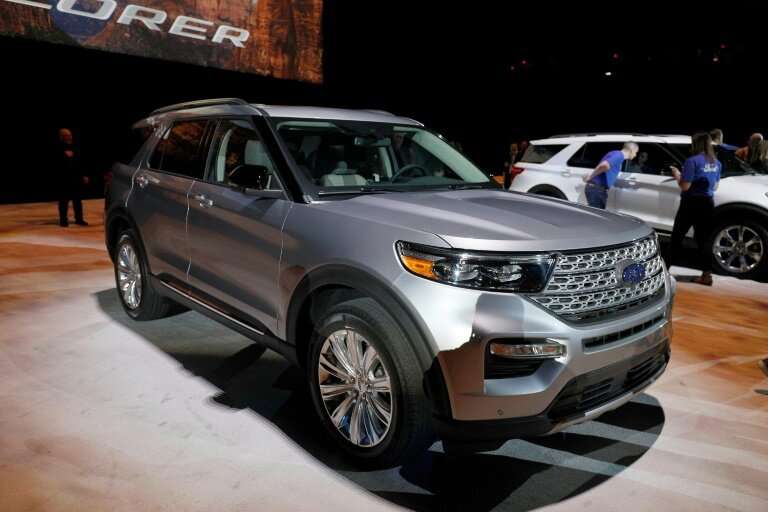Ford's redesigned Explorer SUV is on public display for the first time at the Detroit auto show
SUVs, trucks and sports cars took center stage Monday as a subdued Detroit auto show kicked off with fewer carmakers and more uncertainty.
Automakers have all but abandoned compact cars and sedans, an ever-shrinking portion of the North American market, as evidenced by what the models on display.
Trucks, SUVs and high-performance vehicles dominated the new debuts at the US's premier auto show. Volkswagen was among the few exceptions with a new Passat sedan.
"Frankly, it's about useable space," Bill Ford, chairman of the eponymous car company, told reporters. "It's very clear that our customers are saying to us: we want more usable space."
Ford for the first time publicly displayed a redesigned Explorer SUV, including a hybrid version, which first debuted in Detroit on Friday. Fiat Chrysler unveiled redesigns of larger models of its popular Ram truck.
For those looking for an alternative, carmakers were emphasizing sporty cars and nostalgic pasts—largely eschewing the traditional sedan in favor of more flashy options.
With a flair of showmanship that included virtual-reality goggles and a sports car levitating down from the ceiling, Ford revealed a high-powered version of the Mustang called the Shelby GT500—boasting of more than 700 horsepower.
A practically jubilant Akio Toyoda introduced a refresh of his beloved sports car Supra, which Toyota stopped producing 17 years ago. Toyoda trotted out Spanish racecar driver Fernando Alonso to attest to the car's racing authenticity with an everyman appeal.
"It's like a race car you can drive quite comfortably every day," Alonso said during a scripted presentation.
Future 'less positive'
Aside from VW, German carmakers abandoned the Detroit show this year, amid competition from events in New York, Miami and Las Vegas where increasingly tech-centered car announcements were presented.
Hoping to revitalize the show, organizers were holding the event for the last time in January, moving to June next year to allow for outdoor activities such as test drives.
For the industry at large, the hope was that bigger and more profitable SUVs and trucks would help weather economic storms—whether from tariffs or fewer consumers buying cars due to rising prices, higher interest rates, or a lagging world economy.
Analysts predicted slowing sales in 2019, following a decade of growth.
"We believe that the future is increasingly looking less positive for the industry," said Jonathan Smoke, chief analyst for Cox Automotive, whose firm has forecast 16.9 million new car sales in 2019, down from 17.3 million in 2018.
"The market itself is adjusting to a slightly smaller volume but they happen to be more expensive, higher quality vehicles," he said.
The Detroit show was also clouded by uncertainty in US regulatory policy.
Beijing and Washington remained locked in a trade war that could escalate as soon as next month, when the Commerce Department is expected to deliver a report on possible new auto tariffs.
Analysts predict rapid contraction in the auto industry should more tariffs take effect.
"Tariffs would be devastating to the entire industry," said Robert Carter, chief of Toyota's North American sales, adding that vehicle prices would increase and suppress sales.
"Not only would it affect the Toyota brand, it's going to affect every brand in the industry, every car in the industry," he said.
Small cars and conventional sedans accounted for less than a third of last year's new car purchases—down four percent from 2017.
The industry has invested heavily in SUVs and trucks, making them more luxurious and high tech, analysts said.
Meanwhile, small car and sedan production has been downsized or abandoned by many companies.
GM has announced plans to close underused US plants that make smaller cars. Ford planned similar cost-cutting moves in Europe.
© 2019 AFP
























